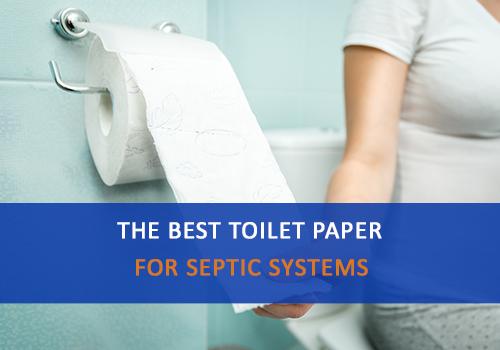It’s easy to underestimate septic problems if you’ve never experienced one. And truth be told, what gets flushed down your toilet plays a huge role in how well your septic will perform for years to come.
Make no mistake… your septic is not a mystical portal, where all of the waste just magically disappears.
In order for a septic system to function properly, waste needs to be allowed to break-down and biodegrade. If you consistently use toilet paper that doesn’t break down properly, it can accumulate, lead to the creation of ‘septic sludge,’ and can eventually back up your system.
These types of problems can be expensive and difficult to fix! So let’s dig in and get to the bottom of it. What is the best toilet paper for septic systems?

Choosing The Best Toilet Paper For Your Septic: The Basics
There are a number of factors that go into choosing the best toilet paper for septic systems.
These factors include…
- Whether or not the toilet paper is ‘septic safe’ (certified by the NSF is best)
- Whether or not the toilet paper is recycled (recycled is usually better)
- How biodegradable the toilet paper is (the more, the better)
- How quickly the toilet paper will break down (the faster, the better)
Are All Toilet Paper Brands The Same?
The answer to this question is a definite no. Companies do not necessarily have to abide by any sort of ‘rule set’ to be allowed to produce toilet paper.
And in the long run, using low quality toilet paper can absolutely damage your septic and lead to long-term problems.
What Brand Of Toilet Paper Is Best For Septic Systems?
There are a number of brands of toilet paper that are actually better at dissolving than others.
And interestingly enough, you can’t always tell by the price.
Some of the best-dissolving toilet papers are also a lot less expensive, while some of the worst toilet paper for your system is heavy, thick, and costs a lot.
But there are some brands that tend to do a better job of this than others.
These include brands such as…
- Scott Rapid-Dissolving: Made For RVs and Boats (dissolves up to 4x faster)
- Natural Value 100% Recycled Bathroom Tissue (chlorine and bleach free)
- Silk’n Soft Bamboo Toilet Paper (biodegradable and septic safe)
- Cottonelle Ultra ComfortCare Toilet Paper (dissolves better than most other quilted toilet paper)
There are others, of course. But as a general rule, brands that are officially certified as ‘septic safe’ are going to be much better for your septic system over time than brands that aren’t.
What Toilet Paper Dissolves The Best?
Since labels and adverts can be deceiving, one of the best ways to know for sure which type of toilet paper is best for your septic system is to perform a simple test.
Purchase 4 or 5 different types of toilet paper, grab a mason jar, and fill it half-full with water.
Drop a sheet of the toilet paper into the water, and shake it for a good five seconds.
How much did the toilet paper dissolve? How much of it remained intact?
Do this with all of the different types, and you will easily see which toilet paper breaks down faster.
As a general rule, the better the toilet paper is at breaking down quickly, the better it is going to be for your septic system in the long run.
What Is Certified Septic Safe Toilet Paper?
Anyone can print the words ‘septic safe’ on their toilet paper.
So the best way to check to see if the product is actually certified ‘septic safe’ is to see if it has been certified by the National Sanitation Foundation, or NSF.
If you see the NSF label on the packaging, you can rest assured that the company has gone to quite a lot of effort to make sure that the toilet-paper in question was rigorously tested, and created to dissolve correctly.
Do I Need Special Septic Safe Toilet Paper?
While this might not qualify as an ‘immediate emergency,’ it is something that you should strive to be aware of.
You don’t necessarily have to toss out the toilet paper you’re using now — especially with national toilet paper shortages. Just make sure that next time you go to buy some, you take a bit of extra time and care.
Either test what you buy, or make sure that it is truly a septic-safe product. Years down the road, you’ll save countless dollars and a lot of time and hassle.

